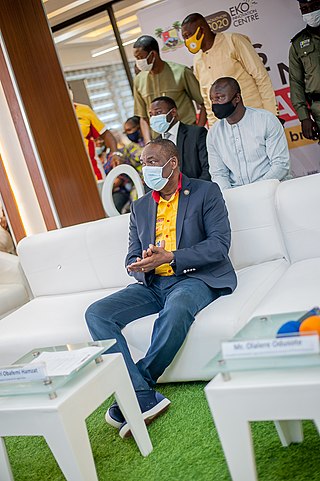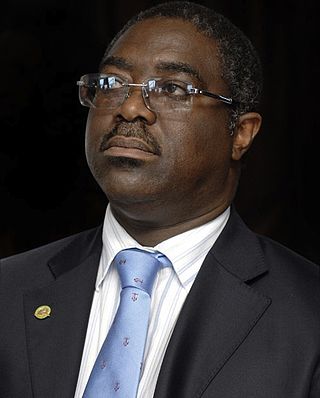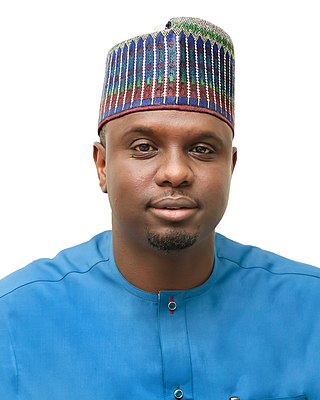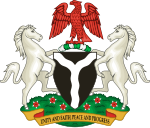
Chief Bola Ahmed Adekunle Tinubu is a Nigerian accountant and politician who is the president-elect of Nigeria. He served as governor of Lagos State from 1999 to 2007 and senator for Lagos West during the brief Third Republic.
Babagana Kingibe OV GCON is a Nigerian diplomat, politician and civil servant who has held several high ranking government offices, culminating in his appointment as the Secretary to the Government of the Federation from 2007 to 2008. He spent over a decade in the Foreign Service cadre and has been in politics since the 1970s serving six heads of state; most recently as a member of the inner circle of President Muhammadu Buhari.

The Federal Executive Council (FEC) is the cabinet of the Federal Republic of Nigeria and is part of the executive branch of the Government of Nigeria. The council's role, as written in the Ministers' Statutory Powers and Duties Act, is to serve as an advisory body to the President of Nigeria, who serves as the FEC's chairman. Members of the cabinet are appointed and report to the President, who can dismiss them at will. The cabinet currently consists of 24 Federal Ministries, each responsible for some aspect of providing government services, as well as a number of parastatals (government-owned corporations).

Babatunde Raji FasholaSAN is a Nigerian lawyer and politician who served as federal minister of Works and Housing of Nigeria from 2019 to 2023. He previously served as minister of Power, Works and Housing from 2015 to 2019. He also served two terms as governor of Lagos State from 29 May 2007 to 29 May 2015.
Nigerian Electricity Regulatory Commission(NERC) is an independent regulatory body with authority for the regulation of the electric power industry in Nigeria. NERC was formed in 2005 under the Obasanjo administration’s economic reform agenda through the Electric Power Sector Reform Act, 2005 for formation and review of electricity tariffs, transparent policies regarding subsidies, promotion of policies that are efficient and environmentally friendly, and also including forming and enforcing of standards in the creation and use of electricity in Nigeria. NERC was instituted primarily to regulate the tariff of Power Generating companies owned or controlled by the government, and any other generating company which has a licence for power generation and transmission of energy, and distribution of electricity.

The Federal Ministries of Nigeria are civil service departments that are responsible for delivering various types of government service. Each ministry is headed by a Permanent Secretary who reports to a Minister in the Federal Cabinet. Some government functions are provided by "commissions" or parastatals that may be independent or associated with a ministry.

Kadri Obafemi Hamzat is a Nigerian politician who has served as deputy governor of Lagos State since 2019.

Babatunde FowlerListen is a Nigerian public officer, tax administrator and social reformer. He was the executive chairman Lagos State Board of Internal Revenue and Chief Executive Officer Lagos State Internal Revenue Service. He is the former executive chairman of the Federal Inland Revenue Service (FIRS).

The Second Cabinet of President Muhammadu Buhari consists of the ministers appointed in the Buhari Administration to take responsibility for each of the government ministries of Nigeria following the 2019 elections. Most ministers were sworn in on 21 August 2019.
Emmanuel Ibe Kachikwu is a Nigerian politician and lawyer who served as the Minister of State for Petroleum Resources and former Group Managing Director of the Nigerian National Petroleum Corporation. He was replaced by Timipre Sylva who took over the ministerial portfolio in August 2019.

Buhari's anti-corruption war is an anti-graft war declared by Muhammadu Buhari, the 6th democratic President of Nigeria. This is a war against all forms of corruption in Nigeria. During the president's election campaign in 2015, he vowed to fight against corruption and insecurity if elected. Since his election in April 2015, anti-graft war remain one of his topmost priority. The anti-graft war was endorsed by the President of the United States. The United States Secretary of State, John Kerry at the World Economic Forum held at Davos in Switzerland extolled Buhari's anti-graft war. In October 2015, the United Kingdom pledge her support for Buhari's anti-corruption war. According to Grant Shapps, the minister for international development, "UK is fully committed to helping Nigeria increase its security, stability and prosperity. "We would continue to provide capacity building, technical and investigative support to Nigeria to tackle corruption. Corruption in Nigeria also affects the UK directly. Where we have evidence, we will continue to take action to protect the integrity of the UK's financial system and prevent. Some Nigerian described the war as "perfect" while others described it as "selective". William Kumuyi, the founder and general overseer of Deeper Christian Life Ministry described Buhari's anti-corruption war as a step in right direction. However, the president has been criticized and accused of leading a selective war against corruption. Several people claimed that his war against corruption focus on members of the opposition party, the People's Democratic Party.

Sanusi Mohammed Ohiare is a Nigerian rural energy development expert, public servant, the executive director of the Rural Electrification Fund and board member of the Rural Electrification Agency who was appointed by president Muhammadu Buhari in April 2017. The Rural Electrification Agency is one of the federal government agencies under the Ministry of Power, Works and Housing. He was reappointed as executive director of the rural electrification fund in January 2022 for another five years term by president Muhammadu Buhari.

Ahmad Salihijo Ahmad is a Nigerian Engineer and renewable energy advocate. He is the current Managing Director of Nigerian Rural Electrification Agency.
Muhammad Mamman Nami is a Nigerian accountant, management professional, tax administrator and public officer. He is the current Executive Chairman of Nigeria's Federal Inland Revenue Service FIRS, the agency responsible for assessing, collecting and accounting for tax and other revenues accruing to the Federal Government of Nigeria. He has almost three (3) decades of practical working experience in Auditing, Tax Management and Advisory and Management Services to clients in the Banking, Manufacturing Services and Public Sectors as well as Non- Profit organizations.
Mamman Kwagyang Saleh, is a Nigerian government official that served as Minister of Power from August 2019 to September 2021. He was sworn in by President Muhammadu Buhari on 21 August 2019 after being nominated by Buhari and confirmed by the Senate. On 1 September 2021, Mamman was sacked by Buhari and replaced by Minister of State for Works and Housing Abubakar Aliyu.
The Ministry of Transportation is a branch of the federal government of Nigeria responsible for watching the movement of people and goods across the country. Mu'azu Jaji Sambo is the Minister of Transportation, and is the Minister of State Transportation. They were appointed by Nigerian president Muhammadu Buhari. The ministry oversees road vehicles, aviation, and rail transport.
Ambassador Zubairu Dada was born on in Minna, Niger State. He is the minister of State Foreign Affairs of the Federal Republic of Nigeria, appointed in 2019. He was the director of Mass Mobilization for Self Reliance, Social Justice, and Economic Recovery from 1993 to 1993 where he rose to a position of Director, National Orientation Agency (NOA).

The Enugu-Port Harcourt Expressway was constructed in the late seventies during the Nigerian military regime. The route connect the country's five states in the country's South-East Geopolitical Zone. The highway runs for 41.4 kilometres, beginning at the Aba Rail Crossing Bridge in Aba township in Abia state and ending at the Eleme Junction Flyover in Port Harcourt, Rivers state.

The First Cabinet of President Muhammadu Buhari consists of the ministers appointed in the Buhari Administration to take responsibility for each of the government ministries of Nigeria following the 2015 elections. Most ministers were sworn in on 11 November 2015 and the cabinet was dissolved on 28 May 2019, the day before Buhari's second inauguration.
Mu’azu Jaji Sambo, is the Minister of Transportation of the Federal Republic of Nigeria appointed by President Muhammadu Buhari on 6 July 2022. He was earlier appointed as the Minister of State for Works and Housing in 2021 before he was moved by the President to the Ministry of Transportation












